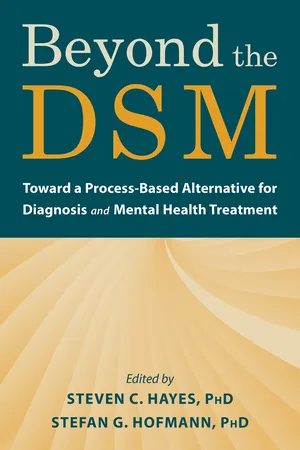About this book
As a mental health clinician, you know that every client is unique, and a client's symptoms are the result of a complex combination of psychological, environmental, genetic, and neural factors. However, the de facto DSM model poses considerable constraints on how you can treat clients—often resulting in a one-size-fits-all diagnosis. This important volume challenges the assumptions and approach made by the DSM, and provides a vision and plan for an evidence-based, process-based approach to individualized care.
With contributions from renowned experts in the field—including Steven C. Hayes, Stefan G. Hofmann, Joseph Ciarrochi, Matthew McKay, Uma Vaidyanathan, Sarah Morris, David Sommers, J. Scott Fraser, and many more—this groundbreaking book will show you a new way to recognize the complexity of human suffering and human prosperity. You'll find solid tips for treating a wide variety of psychological issues in a more flexible way. And, finally, you'll come away with a greater understanding of the "processes of change, " and how to build a solid foundation for an alternative to syndromal diagnosis.
The future of mental health treatment is process-based. Whether you're a clinician, researcher, student, instructor, or other professional working in the mental health field, this breakthrough volume offers everything you need to understand process-based treatment and create a more customized and effective approach to treating clients.
Tools to learn more effectively

Saving Books

Keyword Search

Annotating Text

Listen to it instead
Information
Table of contents
- Contents
- 1. Creating an Alternative to Syndromal Diagnosis: Needed Features of Processes of Change and the Models that Organize Them
- 2. The NIMH Research Domain Criteria Project: A Decade of Behavior and Brain Integration for Translational Research
- 3. Shifting Paradigms: From the DSM to the Process of Change
- 4. Psychological Vulnerabilities and Coping Responses: An Innovative Approach to Transdiagnostic Assessment and Treatment Planning in the Age Beyond DSM-5
- 5. Expectations and Related Cognitive Domains: Implications for Classification and Therapy
- 6. Learning, Language, and Derived Behaviors: Some Implications for a Process-Based Approach to Psychological Suffering
- 7. Cultural and Social Influences on Individual Variation in Emotion Processes
- 8. What a Complex Systems Perspective Can Contribute to Process-Based Assessment and Psychotherapy
- 9. Psychological Flexibility in Chronic Pain: Exploring the Relevance of a Process-Based Model for Treatment Development
- 10. A Multilevel, Multimethod Approach to Testing and Refining Intervention Targets
- 11. Building a Process-Based Diagnostic System: An Extended Evolutionary Approach
- About the Author
- Index
Frequently asked questions
- Essential is ideal for learners and professionals who enjoy exploring a wide range of subjects. Access the Essential Library with 800,000+ trusted titles and best-sellers across business, personal growth, and the humanities. Includes unlimited reading time and Standard Read Aloud voice.
- Complete: Perfect for advanced learners and researchers needing full, unrestricted access. Unlock 1.4M+ books across hundreds of subjects, including academic and specialized titles. The Complete Plan also includes advanced features like Premium Read Aloud and Research Assistant.
Please note we cannot support devices running on iOS 13 and Android 7 or earlier. Learn more about using the app
